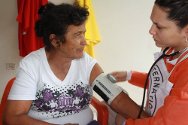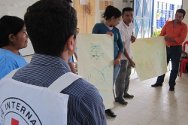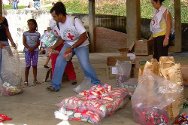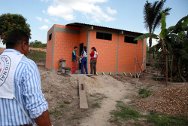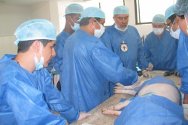Colombia: worrying increase in violations against health-care services
28-09-2011 Operational Update
This year, ICRC delegates in Colombia have seen a worrying trend emerging. From January to August 2011, they recorded 35 breaches of international humanitarian law protecting medical personnel and facilities – over 50 per cent more than the number recorded during the same period in 2010 – ICRC activities from January to August 2011.
Among other incidents, doctors working in conflict zones have been threatened and ambulances have been held up.
"It's alarming to see such a sharp increase in incidents like these," said Christophe Beney, outgoing head of the ICRC’s delegation in Colombia. "It only takes one doctor to be threatened for entire communities to suffer."
Improving access to health-care services
The ICRC ran training workshops for 2,200 staff from over 260 rural health-care facilities, to equip them to carry out their activities in greater safety.
It also led three sessions to raise awareness of the protection that international humanitarian law affords medical personnel and facilities. These sessions, backed by the Colombian Red Cross and the office of the country’s vice-president, under the presidential human rights programme, were attended by 200 members of the police and armed forces.
Workshops were carried out in Antioquia, Arauca, North Santander and Cauca, to enable the ICRC to implement a departmental plan for health-care services jointly with the Ministry of Social Protection, the office of the vice-president and the Colombian Red Cross. These were attended by 155 people.
The ICRC brought in medical teams and accompanied local health-care personnel to areas affected by armed conflict – namely, Puerto Libertador and Tierralta (Córdoba), Caguán (Caquetá) and Ituango (Antioquia) – making basic health-care services available to more than 15,000 inhabitants. Around 6,400 people received treatment and 1,300 were vaccinated.
The ICRC also assisted some 120 victims of sexual violence, 340 war-wounded and 550 patients in high-priority conflict zones, by offering economic support and guidance on where to access needed medical and psychological attention.
Reducing the risks posed by weapon contamination
• A total of 126 activities were carried out to promote safe behaviour and to raise awareness of victims' rights, reaching almost 3,200 inhabitants of remote conflict-affected areas.
• First-aid training was delivered to over 300 people living in weapon-contaminated areas, equipping them to deal with an emergency in the absence of health-care professionals.
Improving access to orthopaedic services
In the first half of the year, the ICRC helped 16,000 patients to access physical rehabilitation and other services, through the six support centres with which it works. Over 3,800 prosthetic limbs and orthopaedic devices were distributed.
Supporting families living in conflict zones
Some 12,000 inhabitants of conflict-affected areas benefited from farming projects and community-based assistance, such as the rehabilitation of six schools for more than 1,100 children.
- In Guaviare department, five farming projects benefited 1,300 people in San José del Guaviare, El Retorno, Miraflores and Calamar.
- In Putumayo department, cocoa- and rice-growing projects benefited 2,500 people in San Miguel and Puerto Leguízamo.
- In Argelia, Cauca department, more than 560 people took part in projects supporting stockbreeding, pig-breeding and the cultivation of food crops.
- In Cartagena del Chairá, Caquetá department, 78 people benefited from a sugar-cane cultivation project.
- In Barbacoas, Nariño department, 385 people took part in stockbreeding and chicken-breeding projects.
- In Tolima, Caquetá, Valle and Chocó, just over 3,100 people benefited from six projects to bolster community infrastructure relating to water, sanitation and habitat.
Assisting people displaced by conflict and floods
The ICRC distributed food and other basic necessities to over 28,000 people who had been internally displaced for various reasons, including almost 12,400 people affected by winter weather conditions.
- Emergency water supply and sanitation projects were set up for 2,200 people who had fled their homes to escape the armed conflict and found refuge in temporary shelters in Córdoba, Nariño, Cauca, Valle and North Santander.
- Over 200 people affected by the severe winter spell received water and basic sanitation and hygiene items in North Santander and San José del Guaviare.
Following up on reported violations of international humanitarian law
The ICRC documented 440 cases of alleged violations of international humanitarian law and other fundamental rules, reportedly committed by the parties to the conflict. To prevent further breaches, the ICRC made 278 representations (26 in writing) reminding the armed groups of their obligation to respect those rules.
It also:
- covered the funeral costs involved in 70 cases, where the loss of a loved one had pushed the family closer to poverty;
- gave financial support to 330 people threatened with death, to enable them to move to a safer place.
Sharing expertise on the issue of missing persons
The ICRC and the National Forensic Institute headed the Third National Seminar on Missing Persons in Bogotá. This was an opportunity for experts to meet and share their experiences of working in the field of forensics, social work, psychology, law and ethics, in connection with activities to trace, retrieve, identify and hand over the remains of persons reported missing.
Visiting detainees
The ICRC regularly visits places of detention managed by the National Prison System Institute (INPEC) in order to check on detainees' treatment. Between January and August, 336 detainees were interviewed during 71 visits to 45 places of detention, and just over 4,000 were individually monitored.
With logistical support from the Brazilian authorities, the ICRC facilitated the release of two politicians and four members of the police and armed forces who were being held by the Revolutionary Armed Forces of Colombia (FARC).
Promoting international humanitarian law
- The ICRC ran 10 workshops to train around 580 officers of the police and armed forces in the application of international humanitarian law to the planning, execution, monitoring and evaluation of operations.
- It also conducted six courses on "Journalists, armed conflict and international humanitarian law" in Medellín, Buenaventura, Bucaramanga, Cali, Montería and Bogotá.
